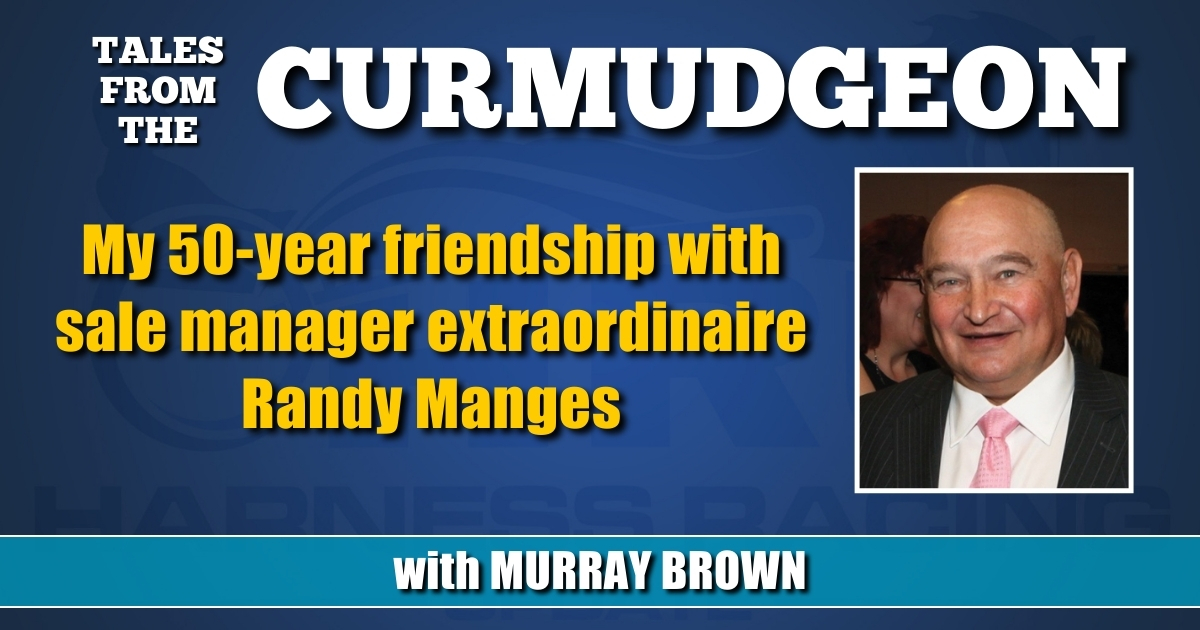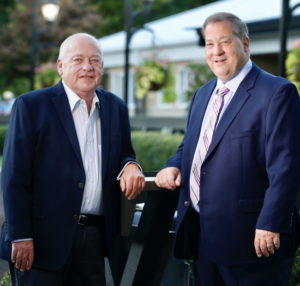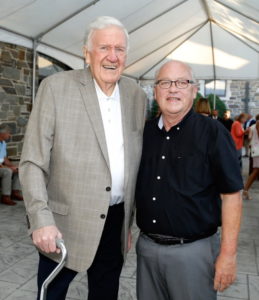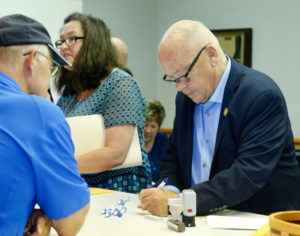My 50-year friendship with sale manager extraordinaire Randy Manges
by Murray Brown
I’ve been friends with Randy Manges for over 50 years. We first met in 1970 when he came to the Hanover Fairgrounds that October for a yearling show day accompanied by his friend Olin Davis. Randy recalls that after the show day was finished, I took him out to see his favorite mare Sara Lane Hanover.
It’s such a small world that we inhabit.
Upon introducing me to Olin, I noted to Mr. Davis that my first favorite horse was a tough old critter by the name of Snipe Reward. Snipe Reward was an open pacer on the Richelieu-Blue Bonnets Circuit. One thing that I remember about Snipe Reward was that if the track was muddy, it. was time to put your money down on him. I can’t ever remember him not winning on an off track. Snipe Reward was bred, raised and initially raced by Olin and his wife Ruth.
But Snipe Reward was not the best horse that the Davises raised. That honor was held by Snipe’s sister, Quick Lady, one of the first great fillies that I ever saw.
I also have a connection to her. I’m guessing that it was in the early ‘60s. Four friends and I made our first trip to Vernon Downs for a Saturday evening’s racing.
I believe that it was on the Saturday previous to Grand Circuit week. There were a lot of young horses on the card. It was in that area where I prized myself as an astute handicapper.
Believe it or not, I swept the first five races. It might have been four, but who’s counting? In the next race, an invitational, Dancer Hanover was the prohibitive favorite. I could be mistaken on this, but I believe that he was driven that evening by Johnny Thomas, Jim Simpson’s number one assistant. I decided to bet everything that I had won, in addition to my original stake on Dancer. I think it might have been in the area of $400. Four hundred dollars was probably the most money I had ever had. I’m guessing that it would probably translate to $4,000 today. Dancer Hanover cut the mile. But at the end, a bolt of lightning by the name of Quick Lady came all the way from China. Photo finish! I thought that I had been beat. Fortunately, Dancer Hanover held on for the smallest of noses and I was able to collect.
The next evening, the five of us had dinner at Moishe’s Steak House in Montreal courtesy of Vernon Downs.
That is not the only connection I had with the Davis family. I’ve been friends with daughter Judy and her mom Ruth since the mid-‘70s. Ruth was the very best signature runner that any horse sale ever had. I’m not certain how old she was when Judy forced her to quit. I’m guessing she was somewhere in her 70s. But even at that age, she could outlast any of the younger people doing it. Judy also collected signatures for a few years, but she couldn’t hold a candle to Ruth. But neither could anybody else.
I’ve switched rails. This story is about Randy Manges. I’ll add only one other thing about the Davises. Randy went to school with Judy and worked with her at Brandywine and to this very day they are the best of friends. Judy is the long-time head of the Delaware Development Racing Fund.
Randy Manges was born into harness racing. He has done nothing else in numerous capacities all of his life.
He was born in Northville, MI where his father was racing a stable of horses. I never had the pleasure of meeting Del Manges, but from those who knew him, he was an outstanding all around horseman as well as being an exceptional human being. He spent the majority of his racing career on the Buffalo-Batavia circuit from the ‘50s through the ‘80s where his stable often led the ranks.
According to Randy, the only thing that kept his father from achieving the recognition that he deserved, was lacking an owner with deep pockets. Nevertheless, he did very well with what he had.
Randy himself, did not have that much direct contact with the horses growing up. However, he was a caretaker and jogged horses throughout his early youth.
Upon graduation, he went to work in the program department at Brandywine with John Bradley where they worked for American Publishing.
Eventually, Brandywine started producing their own programs and Randy stayed on working in that department at both Brandywine and Liberty Bell on the circuit of those tracks.
In whatever spare time he had, he also served as assistant racing secretary at Dover Downs.
In 1976, he was approached by the incomparable Phil Tully for a position with Phil’s Woodstock Stud. He remained there for seven years.
From there, he was on his own for a bit and then worked one year with yours truly at Harrisburg.
He was then approached by Andy Grant and went to work for Andy’s Bradford Bloodstock Agency for 11 years.
Grant had several irons in the fire including being the president of the Hambletonian Society.
He decided to back down and closed Bradford.
Kentucky Standardbred Horses Sales Company had decided to hold a yearling sale at Garden State Park. Dr. Glen Brown, at that time a principal in the company, approached Randy to run the sale for them. They held two sales at Garden State Park.
In the interim, Bart Glass who was running the company’s primary sale in Kentucky, suffered a stroke. Dr. Brown approached Randy to assume Glass’ duties. He has been with them and their amalgamation, the Lexington Selected Horse Sale, ever since.
Randy ever since we both ran horse sales, the one question each of us has asked the other has always been: How are collections? So I’ll ask you that question, how are they?
“We are in a pretty good place right now. We’ve got a few stragglers, but no one that I’m really concerned about. As you know, it’s usually the same people each year. We will end up, as we usually do, with all debts being paid.”
Let’s talk about some of the people you’ve worked for and with.
Phil Tully
“Phil was a great teacher and an incredibly hard worker. We were a great team, because I’m an early riser and an early worker. Phil on the other hand wouldn’t get into the office until 2 p.m. or thereabouts. But he would stay the rest of the day and into the next morning if necessary. Between us, we pretty much covered the clock. But, because he wouldn’t get in until late, didn’t mean that he expected everybody to do the same. He wanted everybody to do whatever had to be done, regardless of how long it took to do it. He was incredibly kind and loyal to everybody that worked for and with him. If you worked for Phil, he expected you to work hard, but he more than made up for it in the way he treated his people.”
Andy Grant
“Andy was a great person and a great friend. I worked for him for 11 years. Each day, I’d take the train from Delaware to New York City and then trained back at the end of the day. Here’s an interesting story: The very first day I arrived at Penn Station, with all the millions in New York City, who do I meet after getting off the train, but your late wife Marlene. She had just arrived in New York to attend a trainees session for Merrill Lynch for whom she had gone to work. What are the odds of that happening?
“My work with Andy was somewhat different than with Phil. Woodstock was mostly in the business of running horse sales and representing horses at them. Although Bradford Bloodstock did represent a lot of horses at sales, we did more in the way of stallion syndications and European trade. For my first five years there, I worked with Jim Barry as well. Jim was a real gentleman and a class act.”
Dr. Glen Brown
“More than anybody else, he was responsible for me being where I am today. He gave me the ball and allowed me to run with it. Probably any success I’ve enjoyed in this business is due directly or indirectly to him. Since Armstrong Bros. went out of business, we’ve become even closer friends than we were before. He knows and has been involved in just about every facet of management in the business.”
Bart Glass
“Bart was a wonderful man who was as great a judge of livestock as anybody I’ve ever known. He helped me enormously, especially at the beginning.”
David Reid
“He was a good friend before he became co-manager of the sales company and is so to this day. We have our own defined responsibilities. We don’t agree on everything, but we do on most things. Whatever we disagree on we manage to iron out well.”
Randy, you evaluate all of the yearlings for the Ohio Select Breeders Sale and together with Dave Reid you look at and evaluate all of the Lexington yearlings. That certainly amounts to a lot of mileage in the car and a lot of time on the road. Does it ever get to be too much?
“To the contrary, the opposite is the case. I love traveling and do so by car. I won’t fly unless the amount of time it takes me to get to where I’m going is more than 13 hours. Dave and I do most of the major farms together. As for the smaller ones, David handles most of the east, while I do the west. Like you, I enjoy driving and enjoy listening to audio books while I’m on the road.”
Do you have any interesting stories from your years of running the sale?
“I suppose the one that would stand out involves our friend Bill Perretti. Bill had purchased a high-priced yearling and then refused to sign the slip acknowledging that he had had indeed bought it. He claimed the auctioneer and the bid spotters were running him up. He berated them with an onslaught of profanity. I got security and we went to Mr. Perretti. He then took out his profanity on me. I told him that unless he signed the slip he would be removed from the premises and would not be allowed to return. We had him removed. The next day he came to my office. Although, not apologetic, he did sign the sales slip and was allowed to return.”
How did COVDI-19 affect you, especially with regard to your being able to evaluate the Canadian yearlings with Canada being pretty much shut down this past year?
“Obviously, neither Dave nor I went to Canada to look at yearlings. We got Larry Drysdale to look at the ones that I normally do and Steve Bray to look at the ones that Dave usually evaluates.”
What did you think of this year’s sales?
“The Ohio sale was through the roof. The Lexington sale, on a relative basis, was probably even better. It was our second best sale ever, despite the severe restrictions put on it by COVID-19. If I had been told before either one that would be the outcome, I wouldn’t have believed it.”
From a yearling evaluator’s standpoint, who do you think do or did the best jobs in raising and preparing horses for sales?
“I have my thoughts, but I’m not about to let anybody get angry with me. So I’ll just list some in non-numerical order: Carter Duer, Dr. Egloff, Bob Brady, Dr. Peter Boyce, Dr. Bridgette Jablonsky, Steve Stewart, Tom Crouch and I’m sure several that I’ve left out.”
How do you feel about this year’s sales?
“Unless we get another kick in the rear end like COVID-19, or if the situation doesn’t improve, I think we’ll be just fine. If we survived this year, I think we can survive just about anything. We horsepeople are a very resilient lot.”
Have a question or comment for The Curmudgeon?
Reach him by email at: hofmurray@aol.com.





















